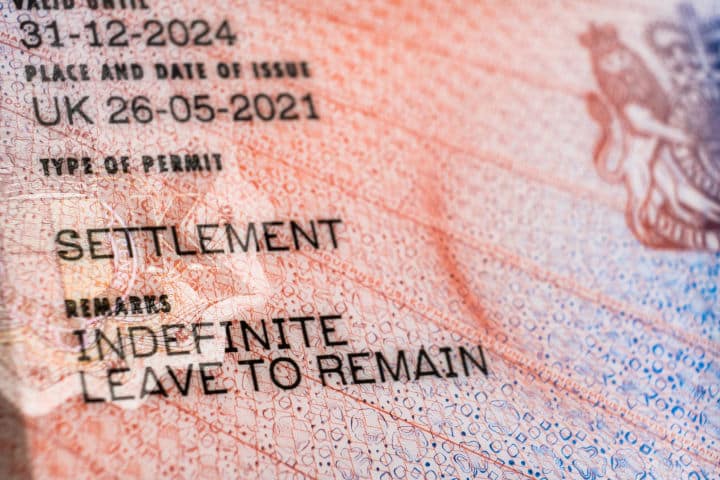The Government has tried to codify international human rights law into domestic laws through the immigration Rules, into sections called Appendix FM and Private Life. However, there remain many situations which do not fit neatly into these Rules.
ILR based on being a family member
If you are applying for indefinite leave to remain (ILR) relying on a family member in the UK, such as a spouse or unmarried partner, then you will probably be applying under a section of the immigration Rules called Appendix FM. Further information about Appendix FM and the different family routes is here.
Within Appendix FM there are two routes to settlement: the ‘five-year route’ and ‘ten-year route’. The five-year route is for those who meet the standard requirements of Appendix FM. The ten-year route is for those who rely on exceptional circumstances and human rights grounds.
If you are unsure which route applies to you then you should check your Home Office paperwork which accompanied your Biometric Residence Permit.
For those applying as a ‘Partner’ (which includes spouses) then the requirements are broadly like the requirements you had to satisfy for your extension. You still need to satisfy the Financial Requirement. However, a different calculation is used from your earlier extension applications.

ILR based on Tier 2 or Skilled Worker
Tier 2 was rebranded as Skilled Worker in December 2020. Indefinite leave to remain for those on the old Tier 2 route or the new Skilled Worker route, brings the advantage of liberation from sponsorship by an employer.
You must have spent a continuous and lawful five-year period in the UK to qualify for indefinite leave to remain. You do not necessarily need to have spent the whole five-year period under Tier 2 / Skilled Worker, although your most recent grant of leave must have been under Tier 2 / Skilled Worker.
You will need to show that you have not been absent from the UK for more than six months in any 12-month period. In addition, you must also not have spent more than 18 months abroad in any five-year period relied upon (although there is a slightly more relaxed rule in certain circumstances if the absences pre-date 11 January 2018, when the rules were tightened).
Beware that you will still need your existing employer to sponsor you for the ILR application!
ILR based on Long Residence
The key requirement for indefinite leave to remain based on Long Residence is that you have completed at least 10 years’ continuous and lawful residence in the UK. This can include leave in any mixture of immigration categories.
Long Residence can often provide a quicker route to ILR than your existing immigration route, particularly if you have held leave in several different categories prior to your current route.
As an example, you might have spent four years studying followed by three years working under Tier 2 or Skilled Worker, before ‘switching’ into the spouse category under Appendix FM: at this stage you have seven years’ continuous leave in two categories. Rather than complete the full five years under Appendix FM, you should consider completing three years under Appendix FM, thus hitting the 10-year mark in combined leave, before applying under Long Residence.
For Long Residence you will need to show that you have not been absent from the UK for more than six months at any one time. You will also need to show that you have not spent more than 18 months abroad over the 10-year qualifying period.
Recent success story
ILR based on Tier 1 Investor
The standard route to settlement for a Tier 1 Investor requires five years’ continuous residence in the Tier 1 Investor category. However, this can be reduced to three years if you invest £3 million and as little as two years if you invest at least £5 million.
Tier 1 Investors need to pay careful attention to how the Home Office interpret ‘continuous residence’. Continuity of residence is considered to be broken if you are absent from the UK for more than 180 days in any 12-month period (although there is a slightly more relaxed rule in certain circumstances if the absences pre-date 11 January 2018, when the rules were tightened).
You will need to show you have a level of English at Level B1 or above when you apply for ILR, something not required in earlier extension applications.
ILR based on Tier 1 Exceptional Talent
The route to indefinite leave to remain for those granted under the Exceptional Promise sub-category of Tier 1 Exceptional Talent is five years. However, for those granted under the ‘full-fat’ Exceptional Talent sub-category then qualification for ILR can come after a mere three years.
You do not necessarily need to have spent all of your qualifying period under Tier 1 Exceptional Talent – certain other categories can also be included, although you must always hold Tier 1 Exceptional Talent at the point of applying for ILR.
You will need to show that your Designated Competent Body has not withdrawn your endorsement. You will also need to show that you earned money in the UK in your field of expertise, during your most recent period of Tier 1 Exceptional Talent leave.
Continuity of residence is considered to be broken if you are absent from the UK for more than 180 days in any 12-month period (although there is a slightly more relaxed rule in certain circumstances if the absences pre-date 11 January 2018, when the rules were tightened).
ILR based on Tier 1 Entrepreneur
The standard route to indefinite leave to remain as the holder of leave to remain as a Tier 1 Entrepreneur is five years. However, this can be reduced to just three years in one of the following circumstances: where you have turnover of at least £5 million, or where have you created at least 10 jobs.
Continuity of residence is considered to be broken if you are absent from the UK for more than 180 days in any 12-month period (although there is a slightly more relaxed rule in certain circumstances if the absences pre-date 11 January 2018, when the rules were tightened).
ILR based on Settled Status under the EU Settlement Scheme
Many EU nationals and their family members will qualify for a particularly strong form of indefinite leave to remain called Settled Status, under the EU Settlement Scheme. Further details about Settled Status and the EU Settlement Scheme are here.
At Truth Legal we have immigration solicitor Louis MacWilliam who heads up our immigration Team. With over 11 years’ experience as a dedicated immigration specialist, Louis is one of the few genuine immigration experts in the area.
If your next step is Indefinite Leave to Remain, then book a consultation with us today.
Further reading
Read our popular article about Indefinite Leave to Remain.




















